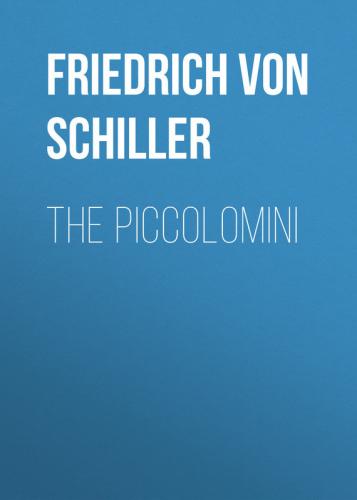That fell beneath their tables. And, at last,
Whom should they send me but a Capuchin!
Straight I began to muster up my sins
For absolution – but no such luck for me!
This was the man, this Capuchin, with whom
I was to treat concerning the army horses!
And I was forced at last to quit the field,
The business unaccomplished. Afterwards
The duke procured me in three days what I
Could not obtain in thirty at Vienna.
Yes, yes! your travelling bills soon found their way to us!
Too well I know we have still accounts to settle.
War is violent trade; one cannot always
Finish one's work by soft means; every trifle
Must not be blackened into sacrilege.
If we should wait till you, in solemn council,
With due deliberation had selected
The smallest out of four-and-twenty evils,
I' faith we should wait long —
"Dash! and through with it!" That's the better watchword.
Then after come what may come. 'Tis man's nature
To make the best of a bad thing once past.
A bitter and perplexed "what shall I do?"
Is worse to man than worst necessity.
Ay, doubtless, it is true; the duke does spare us
The troublesome task of choosing.
Yes, the duke
Cares with a father's feelings for his troops;
But how the emperor feels for us, we see.
His cares and feelings all ranks share alike,
Nor will he offer one up to another.
And therefore thrusts he us into the deserts
As beasts of prey, that so he may preserve
His dear sheep fattening in his fields at home.
Count! this comparison you make, not I.
Why, were we all the court supposes us
'Twere dangerous, sure, to give us liberty.
You have taken liberty – it was not given you,
And therefore it becomes an urgent duty
To rein it in with the curbs.
Expect to find a restive steed in us.
A better rider may be found to rule it.
He only brooks the rider who has tamed him.
Ay, tame him once, and then a child may lead him.
The child, we know, is found for him already.
Be duty, sir, your study, not a name.
Sir president, the emperor has in Germany
A splendid host assembled; in this kingdom
Full twenty thousand soldiers are cantoned,
With sixteen thousand in Silesia;
Ten regiments are posted on the Weser,
The Rhine, and Maine; in Swabia there are six,
And in Bavaria twelve, to face the Swedes;
Without including in the account the garrisons
Who on the frontiers hold the fortresses.
This vast and mighty host is all obedient
To Friedland's captains; and its brave commanders,
Bred in one school, and nurtured with one milk,
Are all excited by one heart and soul;
They are as strangers on the soil they tread,
The service is their only house and home.
No zeal inspires then for their country's cause,
For thousands like myself were born abroad;
Nor care they for the emperor, for one half
Deserting other service fled to ours,
Indifferent what their banner, whether 'twere,
The Double Eagle, Lily, or the Lion.
Yet one sole man can rein this fiery host
By equal rule, by equal love and fear;
Blending the many-nationed whole in one;
And like the lightning's fires securely led
Down the conducting rod, e'en thus his power
Rules all the mass, from guarded post to post,
From where the sentry hears the Baltic roar,
Or views the fertile vales of the Adige,
E'en to the body-guard, who holds his watch
Within the precincts of the imperial palace!
What's the short meaning of this long harangue?
That the respect, the love, the confidence,
Which makes us willing subjects of Duke Friedland,
Are not to be transferred to the first comer
That Austria's court may please to send to us.
We have not yet so readily forgotten
How the command came into Friedland's hands.
Was it, forsooth, the emperor's majesty
That gave the army ready to his hand,
And only sought a leader for it? No.
The army then had no existence. He,
Friedland, it was who called it into being,
And gave it to his sovereign – but receiving
No army at his hand; nor did the emperor
Give Wallenstein to us as general. No,
It was from Wallenstein we first received
The emperor as our master and our sovereign;
And he, he only, binds us to our
